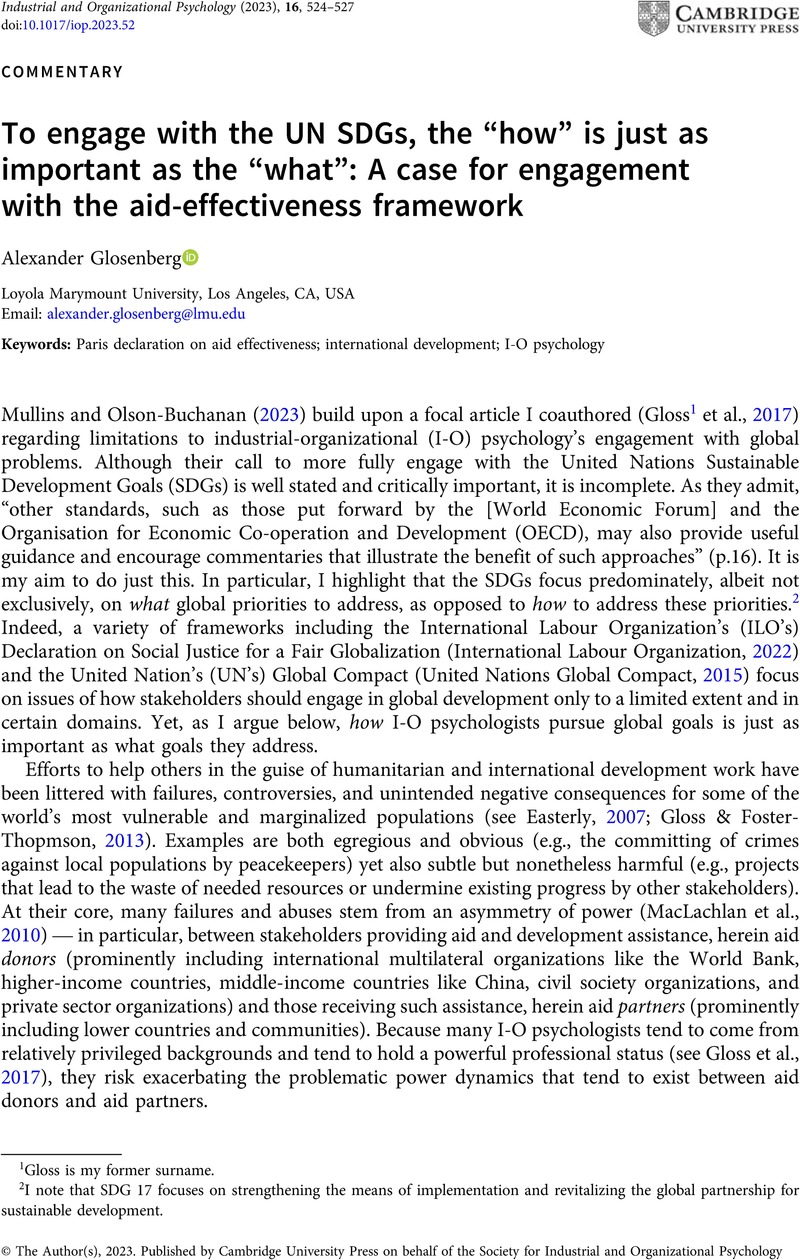No CrossRef data available.
Article contents
To engage with the UN SDGs, the “how” is just as important as the “what”: A case for engagement with the aid-effectiveness framework
Published online by Cambridge University Press: 22 November 2023
Abstract
An abstract is not available for this content so a preview has been provided. Please use the Get access link above for information on how to access this content.

- Type
- Commentaries
- Information
- Copyright
- © The Author(s), 2023. Published by Cambridge University Press on behalf of the Society for Industrial and Organizational Psychology
References
Abdenur, E. A. (2014). Emerging powers as normative agents: Brazil and China within the UN development system. Third World Quarterly, 35(10), 1876–1893.CrossRefGoogle Scholar
Brown, S. (2020). The rise and fall of the aid effectiveness norm. European Journal of Development Research, 32(4), 1230–1248.CrossRefGoogle Scholar
da Silva Nunes, T., Soliman, A., Taguchi, K., Matsoso, P., Driece, R. A., & Tangcharoensathien, V. (2023). Addressing inequity: the world needs an ambitious Pandemic Accord. Lancet, 402(10398), 271–273. https://doi.org/10.1016/S0140-67362301369-7
CrossRefGoogle ScholarPubMed
Easterly, W. (2007). White man’s burden: Why the West’s efforts to aid the rest have done so much ill and so little good. Penguin.Google Scholar
Gloss, A., Carr, S. C., Reichman, W., Abdul-Nasiru, I., & Oestereich, W. T. (2017). From handmaidens to POSH humanitarians: The case for making human capabilities the business of IO psychology. Industrial and Organizational Psychology, 10(3), 329–369.CrossRefGoogle Scholar
Gloss, A., & Foster-Thompson, L. (2013). I-O psychology without borders: The emergence of humanitarian work psychology. In Olson-Buchanan, J. B., Bryan, L. L. Koppes, & Foster-Thompson, L. (Eds.), Using I-O psychology for the greater good: Helping those who help others (pp. 353–393). Routledge Academic.Google Scholar
Gloss, A., Glavey, S. A., & Godbout, J. (2012). Building digital bridges: The digital divide and humanitarian work psychology’s online networks and communities. In Carr, S. C., MacLachlan, M., & Furnham, A. (Eds.), Humanitarian work psychology (pp. 293–316). Palgrave-Macmillan.CrossRefGoogle Scholar
International Labour Organization. (2022). ILO declaration on social justice for a fair globalization. International Labour Organization. https://www.ilo.org/global/about-the-ilo/mission-and-objectives/WCMS_099766/lang--en/index.htm
Google Scholar
Lefkowitz, J. (2008). To prosper, organizational psychology should… expand the values of organizational psychology to match the quality of its ethics. Journal of Organizational Behavior, 29(4), 439–453.CrossRefGoogle Scholar
MacLachlan, M., Carr, S., & McAuliffe, E. (2010). The aid triangle: Recognizing the human dynamics of dominance, justice and identity. Bloomsbury Publishing.CrossRefGoogle Scholar
Mawdsley, E., Savage, L., & Kim, S. M. (2014). A “post-aid world”? paradigm shift in foreign aid and development cooperation at the 2011 Busan high level forum. Geographical Journal, 180(1), 27–38.CrossRefGoogle Scholar
Mullins, M., & Olson-Buchanan, J. (2023). Moving boundaries in what I-O psychology has been, and what I-O psychology can be: The United Nations sustainable development goals as an organizing framework. Industrial and Organizational Psychology, 16(4), 479–494.CrossRefGoogle Scholar
Organization for Economic Co-Operation and Development. (2005). Paris declaration on aid effectiveness. https://www.oecd.org/dac/effectiveness/parisdeclarationandaccraagendaforaction.htm
Google Scholar
Organization for Economic Co-Operation and Development. (2008). Accra agenda for action. https://www.oecd.org/dac/effectiveness/parisdeclarationandaccraagendaforaction.htm
Google Scholar
Taggart, J. (2022). A decade since Busan: Towards legitimacy or a, new tyranny, of global development partnership? Journal of Development Studies, 58(8), 1459–1477.CrossRefGoogle Scholar
United Nations Global Compact. (2015). Guide to corporate sustainability. Organization. https://unglobalcompact.org/
Google Scholar


